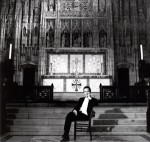Column Name
Title
Gerre Hancock, a Juilliard organ faculty member from 1971 to 2004 who was considered by many to be the finest organ improviser in America, died of cardiac arrest on January 21 in Austin, Tex. He was 77. For the past eight years, he and his wife, organist Judith Hancock, had been living in Austin, where Gerre was professor of organ and sacred music at the University of Texas from 2004 until his death. He had been scheduled to play a recital in St. Louis on January 22 but had cancelled it due to health problems earlier in the week. He is survived by his wife and their two daughters.
Body
Hancock was the organist and master of choristers at St. Thomas Church in New York City from 1971 to 2004; he led the church’s annual Messiah performance, which was perhaps the most critically and popularly acclaimed version in the city.
Gerre Edward Hancock was born in Lubbock, Tex., in 1934 (Buddy Holly was a boyhood friend of his younger brother), and he told The Journal in 2004 that he knew he wanted to be a musician from the time he was a child. He described hearing a pipe organ for the first time, when he was about 6. “I recall that the music was—who else?—J.S. Bach, but that’s about it. Just the sheer beauty of the sounds, wind-blown, coming through those wooden and metal pipes, still thrills me more than I could ever articulate.”
After receiving his bachelor’s in music from the University of Texas at Austin, Hancock received a master’s in sacred music from Union Theological Seminary and also studied in Paris. His teachers included William Doty, Robert Baker, Jean Langlais, Marie-Clare Alain, and Nadia Boulanger. After being drafted into the Army, he served in Korea, toting a field organ with him on bivouac.
Hancock was particularly well-known for his improvisational abilities (a skill that is far more common in Europe than in the U.S.). Paul Jacobs, chair of the organ faculty since 2004, described Hancock as “a titan in the world of sacred music and one of the greatest masters in the art of organ improvisation.” Hancock taught improvisation at Juilliard starting in 1971 and wrote a textbook on the topic in 1994. He was a great teacher, Jacobs said: “As inspiring as his formidable artistic abilities was his generous enthusiasm expressed toward generations of young musicians.” In addition to working with generations of Juilliard students and St. Thomas choristers, Hancock also taught at Yale, Eastman School of Music, and the Cincinnati College-Conservatory of Music.
In the aforementioned Journal article, Hancock said that the most satisfying aspect of teaching was “experiencing the growth of my students and watching and hearing them mature.” One of those students, Craig Campbell (B.M.Ed. ’82, organ), recalled that he had turned down a full scholarship at Southern Methodist University, then an organ powerhouse, to come to Juilliard to study with Hancock, fondly remembering “the confidence that Gerre began to instill in me when I had my first lesson with him.”





